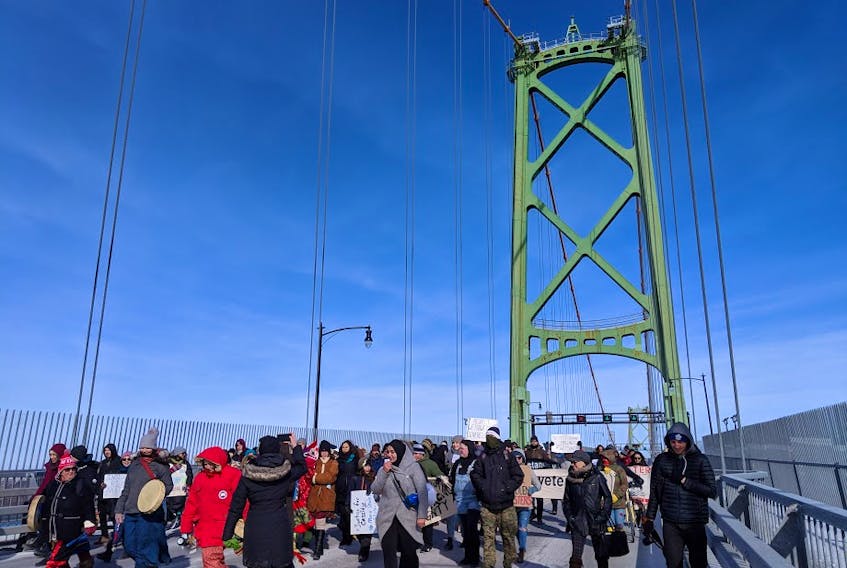About 100 people drummed, chanted and sang their way across the Macdonald Bridge in Halifax to highlight environmental and social issues affecting the aboriginal community.
The protesters started their march at the Dartmouth bus depot on a frigid Saturday and crossed the bridge, which was closed to traffic for about 45 minutes.
Accompanied by a Halifax Regional Police escort, the group made their way down Gottingen Street to the Bus Stop Theatre where speakers addressed issues such as the controversial Alton Gas project, the Wet’suwet’en First Nation pipeline protest in northwestern British Columbia and violence against aboriginal women.
“I want him to be proud of who he is, proud of his rights,” said a woman, who didn't want to be identified, marching with her four-year-old son.
Another marcher, David Wallbridge of Halifax, said he was taking part in solidarity with indigenous people.
“I’m a settler, I’m a white person and I think we need to do more listening and understanding of how we can really bring some reconciliation to what’s happened in our history,” Wallbridge said, “and I think it’s important for people like me to be here and to listen and understand. attended different events.”
Among the speakers at the Bus Stop Theatre was Rebecca Moore, a Mi’kmaw rights advocate and a member of Pictou Landing First Nation, who was one of 14 people arrested at the Gidimt’en anti-pipeline camp in northwestern B.C. last month.
“RCMP, they basically took over, they removed indigenous people from their lands,” Moore said. “The one that I thought was particularly shocking to me was when I saw them remove Molly (Wickham, a Gidimt’en member and spokeswoman for the camp). ... She’s just fighting to defend the water and the land and her territory for her children. . ..
“Being there, and getting to know her and her family and her community, and then seeing her be forcibly removed by RCMP militarized police, that have assault rifles and everything, it was overkill, excessive force was used.”
Suzanne Patles, one of the organizers of the protest and a longtime indigenous rights activist, was happy with the turnout.
“I really enjoyed the amount of people that came out to march, I enjoyed the amount of people who stuck around to listen to the speakers,” said Patles, who came to national attention in 2013 during protests against fracking operations near Elsipogtog First Nation in New Brunswick. “I feel like overall it was a good message and that there was a good response from the public and from the participants."
The signs and chants during Saturday’s march referred to many issues, including the disappearance and murders of thousands of First Nations women in Canada, such as Cassidy Bernard of We’koqma’q, and the Alton Gas project near Stewiacke, which First Nations activists say threatens local water systems.
If there was an overarching theme related to the protest, Patles said it would be the federal government’s treatment of indigenous people.
“We want a more meaningful relationship with the government,” said Patles, who was born in Eskasoni and studies law at Dalhousie University. “We’re not being treated as a nation, we’re being treated as a sub-category of a government.”
In a news release Saturday afternoon, Halifax Regional Police said the event was peaceful and police encountered no issues with the protesters. Police and Halifax Harbour Bridges patrol officers blocked off entrances to the bridge.









